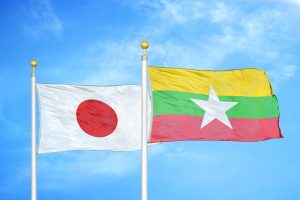Yesterday, Japan’s government announced that it will suspend a training program for Myanmar military officers from next year, after weathering a storm of criticism for its continued links to the Tatmadaw.
Aoki Takeshi, a spokesperson for the Japanese Ministry of Defense, told reporters that the ministry will stop accepting students from the fiscal year 2023, which begins in April, NHK reported.
According to NHK, the trigger for the decision was the military government’s execution of four political prisoners in late July, which was widely seen as a cruel, shocking, and escalatory act, even by the low standards of the Myanmar armed forces.
The executions prompted a group of Japanese lawmakers who support Myanmar’s democratization to demand that Japan cease a program in which cadets from Myanmar are hosted at Japan’s National Defense Academy, where they receive both academic and military training. Aoki said the ministry decided it was not appropriate to continue defense cooperation and exchanges with Myanmar, after the military ignored Japan’s expressions of strong concern about its rare use of the death penalty.
The Japanese training program dates back to 2015, the same year that Aung San Suu Kyi’s National League for Democracy (NLD) swept to power in an acclamatory election. The NLD’s election victory marked the hopeful high-point of Myanmar’s political and economic opening, and led a number of foreign governments to begin engaging with the military after years of sanctions and restricted contact.
However, the Japanese program continued even after the military took power in the country in a coup in February of last year, plunging the country into a new phase of political turmoil that continues to the present. According to the advocacy group Human Rights Watch (HRW), Japan accepted two cadets and two officers to take part in the training program following the coup in 2021. This was followed by a further two cadets and two officers this year.
In May, HRW and the Myanmar-based advocacy group Justice for Myanmar identified a Japanese-trained air force commander that they found was based at an airbase implicated in bombing raids on civilian militia forces opposed to the military junta. Lt. Col. Hlwan Moe was reportedly hosted by Tokyo’s Air Command and Staff College in 2016-17.
Tokyo’s decision to maintain the program after the coup likely has its roots in the country’s fundamentally pragmatic approach to Myanmar and other non-democracies in Southeast Asia. For years, Japan has eschewed the sanctions and trade embargoes imposed by many Western democracies, arguing that constructive engagement was the best way of encouraging change within the Myanmar military, and that moralistic sanctions policies achieved little except to open up a vacuum of influence that will simply be filled by China.
It now appears that the possible practical benefits of retaining a toehold of influence with the Myanmar military are clearly outweighed by the moral and reputational externalities.
Teppei Kasai of HRW said on Twitter that Tokyo’s move was “a step forward,” but that it should “investigate the whereabouts of all other Tatmadaw soldiers who were trained in Japan & publish the findings.” He also called on the Japanese government to join the Western campaign of sanctions against military leaders and enterprises linked to the armed forces.
Given Japan’s history of relations with Myanmar, however, it is unlikely, at least in the short term, that it will make the leap from ending a controversial relationship with the Tatmadaw to proactively punishing it with sanctions and other economic measures. For the foreseeable future, pragmatism will remain the keynote in Japanese policy toward Myanmar.

































